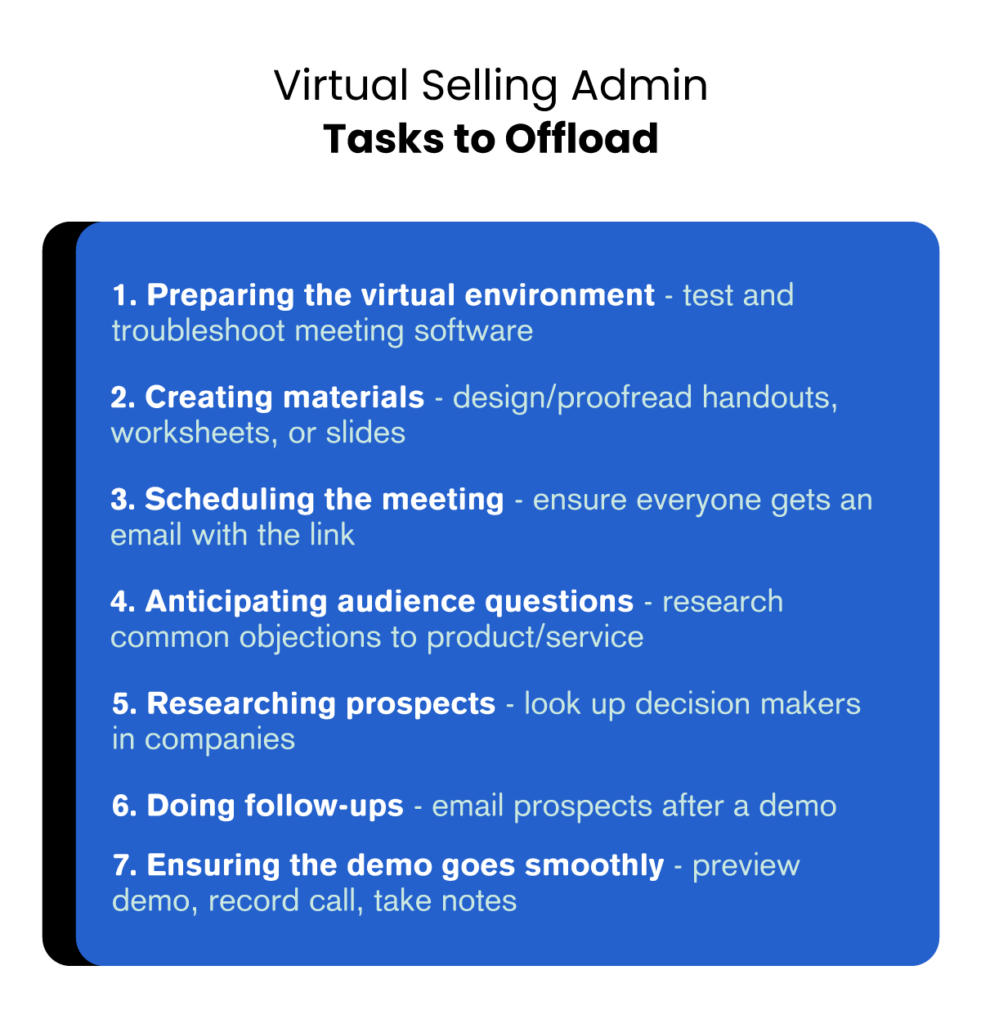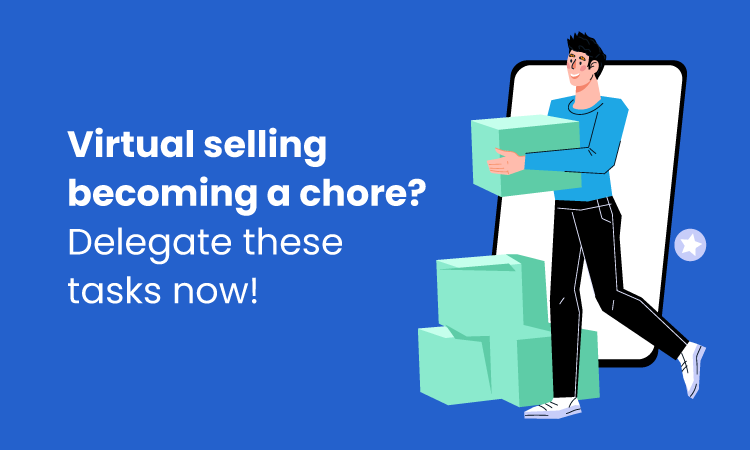One of the most crucial aspects of building a company is generating leads and converting them into customers. Your awesome product or service will not reach its full potential if you don’t have a sales team working hard at showing people what it’s all about. Since sales teams need to reach as many prospects as possible, they must always have efficiency in mind. Enter virtual sales and virtual selling.
What is Virtual Selling?
According to LinkedIn’s Global State of Sales Report for 2021, 55% of buyers believe that remote work has made purchasing easier.
Virtual selling is a process where salespeople use technology to connect with prospects and customers without meeting them in person. There are many different types of technologies that can be used for virtual selling, such as video conferencing, instant messaging, and even social media platforms.
Sales teams must always have efficiency in mind, and virtual selling is a great way to improve efficiency while still providing a high-quality customer experience. Some of the benefits of virtual selling include:
- Increased flexibility and mobility for salespeople
- More control over the sales process
- Increased reach to global markets
- Reduced costs associated with travel
If you’re interested in implementing virtual selling into your sales strategy, there are a few things you should keep in mind. First, you need to have a good understanding of the technology you’ll be using. There’s no point in trying to sell virtually if you can’t figure out how to use the technology properly.
Second, you need to make sure that your sales team is comfortable with the idea of selling without meeting prospects and customers face-to-face. They need to be able to build relationships virtually and understand the importance of providing a great customer experience.
Last but not least, you must have a solid plan in place for how you’re going to measure success.
What Virtual Selling Skills to Develop
Knowing what virtual selling is and why it’s important is one thing. Being aware of what it takes to succeed in selling virtually is another. These skills will help you build relationships, generate leads, and close deals virtually:
- Lead Generation
- Relationship Building
- Communication
- Negotiation
- Closing
Let’s look at each of these sales skills in the following paragraphs.
Lead Generation
The first step in any sales process is generating leads. This can be a challenge when you’re selling virtually, but it’s not impossible. There are a few things you can do to generate leads virtually, such as using social media platforms, attending virtual events, and even conducting online research.
When you’re generating leads virtually, it’s important to focus on quality over quantity. It’s better to have a smaller list of high-quality leads than a large list of low-quality leads. You can use various criteria to determine the quality of a lead, such as their title, company size, location, and even their pain points.
Once you have a good understanding of who your ideal customer is, you can start to generate leads that are more likely to convert into customers.
Relationship Building
The next step in the sales process is building relationships with your prospects. This can be challenging when you’re selling virtually, but it’s still possible to build strong relationships without meeting face-to-face.
There are a few things you can do to build relationships virtually, such as staying in touch via email, phone, or even social media. It’s important to be responsive and available when your prospects need you. You should also focus on providing value, whether it’s helpful information or resources that can help them solve their problems.
The goal is to build trust and credibility with your prospects so they feel comfortable doing business with you. If you can do that, you’ll be well on your way to closing more deals.
Communication
Virtual selling requires excellent communication skills. This is because you won’t have the benefit of body language or other nonverbal cues to help you communicate effectively.
When you’re communicating virtually, it’s important to be clear and concise. You should also focus on active listening, which means paying attention to what your prospect is saying and responding accordingly.
It’s also a good idea to use different channels of communication, such as email, phone, or even video conferencing. This will give you a better understanding of how your prospect prefers to communicate and will help you build a better relationship with them.
Negotiation
The ability to negotiate is another important skill for virtual sellers. This is because you won’t have the benefit of being in the same room as your prospect, which can make it more challenging to come to an agreement.
When you’re negotiating virtually, it’s important to be clear about what you want and what you’re willing to give up. You should also focus on building rapport and trust with your prospect so they feel comfortable doing business with you.
It’s also a good idea to use different channels of communication, such as email, phone, or even video conferencing. This will give you a better understanding of how your prospect prefers to communicate and will help you build a better relationship with them.
Closing
Finally, the last part is closing the deal. This can be challenging when you’re selling virtually, but it’s still possible to close deals without meeting face-to-face.
There are a few things you can do to close deals virtually, such as staying in touch via email, phone, or even social media. It’s important to be responsive and available when your prospects need you. You should also focus on providing value, whether it’s helpful information or resources that can help them solve their problems.
The goal is to build trust and credibility with your prospects so they feel comfortable doing business with you. If you can do that, you’ll be well on your way to closing more deals.
Why Sales Teams Need Virtual Assistants
In today’s world, more and more businesses are going virtual. This means that sales teams need to be able to sell effectively without meeting face-to-face.
While this can be challenging, it’s still possible to close deals and build relationships without meeting in person. There are a few things you can do to sell virtually, such as generating quality leads, building relationships, communicating effectively, negotiating, and closing deals.
If you can master these skills, you’ll be well on your way to success in the virtual world. And one of the best ways to accomplish this is by working with a virtual assistant.
Virtual Selling Tasks To Offload
A virtual assistant can help you with all aspects of the sales process, from generating leads to closing deals. They can also help you stay organized and keep track of your progress.
Working with a virtual assistant is a great way to increase your chances of success when selling virtually. If you’re looking to take your sales game to the next level, consider working with a virtual assistant today. Below are tasks you can offload to a virtual assistant.

Preparing the virtual meeting environment
Your virtual assistant can help you prepare for virtual meetings by testing and practicing using the software, researching how to troubleshoot it, and ensuring that all of the necessary equipment is set up and working properly.
They can also help you create a professional and inviting environment by researching and providing options on how you should decorate your space, set up lighting, and select a background.
Getting the presentation materials ready
Your virtual assistant can help you create presentations by researching your topic, finding and organizing relevant information, designing slides, and rehearsing the presentation.
They can also create and proofread handouts, worksheets, or any other supporting materials that you may need for your presentation, ensuring that participants would find the topic engaging and persuasive.
Scheduling the meeting
Your virtual assistant can help you schedule virtual meetings and send reminders to all participants. They can also help you reschedule or cancel meetings as needed.
A good sales support provider will know how to juggle various complex calendars, so they’ll be able to anticipate scheduling conflicts and find a time that works for all the meeting participants.
Preparing for questions
Your virtual assistant can help you anticipate questions that your audience may have and prepare answers in advance. They can also help you find resources or additional information that you can use to answer prospects’ questions.
Additionally, they can help you develop a system for tracking questions so you can follow up with participants after the meeting. Doing this shows that you’re invested in helping your audience and that you care about their needs.
Researching the audience/prospects
Your virtual assistant can help you research your audience or prospects so you can tailor your message and better understand their needs.
They can also help you develop targeted questions that you can use to generate leads or to qualify prospects. Additionally, they can help you create a list of potential customers, clients, or companies to whom you can reach out.
Doing follow-ups
Your virtual assistant can help you with follow-ups by sending thank-you notes, making phone calls, or sending emails.
They can also help you keep track of your prospects’ responses so you can gauge their interest level and determine whether or not they’re ready to buy.
Preparing a virtual engagement strategy
If you’re selling virtually, it’s important to have a virtual engagement strategy. This will help you stay focused and organized so you can make the most of your time and increase your chances of success.
Your virtual assistant can help you develop a virtual engagement strategy by researching best practices, brainstorming ideas, and creating a plan that’s tailored to your prospects.
Challenges of Virtual Selling
Even with the best preparation, certain challenges are inherent in virtual selling. Below are three of the most common challenges and how you can overcome them.
1. Building trust virtually
One of the hardest things to do when selling virtually is to build trust with your audience. This is because people are more likely to trust someone they can see and interact with in person.
VAs let you focus on building rapport by removing from your plate the other tedious tasks that make up virtual selling. With a VA handling your to-do’s, you’ll be free to concentrate on asking questions and listening carefully to your prospects’ answers. Pay attention to their nonverbal cues and adjust your approach accordingly.
2. Managing time differences
If you’re selling virtually to an international audience, time differences can be a challenge. This is because you may need to adjust your schedule to accommodate your prospects’ time zones.
When you have a VA, you can let them handle scheduling and figuring out the time that’s convenient for both you and the meeting participant. A virtual assistant can also help you record your meeting so your prospect can watch it at their convenience. This way, they don’t have to worry about time differences.
3. Overcoming tech issues
Technology is integral to virtual selling but it can also be a source of frustration. Connection problems, audio issues, and video lag are all common problems that can occur during a virtual meeting.
When you have a VA, you can ask them to test your technology in advance. This way, you can troubleshoot any issues before the meeting starts.
It’s also a good idea to have a backup plan in case of technical difficulties. For example, if your connection falters mid-presentation, your VA could switch everyone over to a phone call or send your presentation over email.
Find the Best Virtual Seller in No Time
By working with a virtual assistant, you can free up your time so you can focus on selling and building relationships with your prospects. A virtual assistant can help you with all of the tasks involved in preparing for, scheduling, and conducting a virtual sale, as well as follow-up tasks.
When it comes to selling virtually, preparation is key. By working with a virtual assistant, you can ensure that you’re as prepared as possible, which will give you the best chance of success.
Speak with our sales team today to learn how Wing virtual sales callers help businesses reach their virtual selling goals!
Aya is Wing Assistant’s blog manager. When she’s not wrangling content briefs, editing article drafts and handling on-page SEO, she is crafting messages for Wing’s other communication materials. Aya writes about SaaS startups, marketing for startups, search engine optimization, and pop culture.






